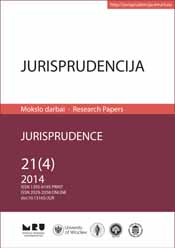AVANCÉES ET LIMITES DE LA PROTECTION DES DROITS DE L’HOMME EN EUROPE
PROGRESSES AND LIMITS OF THE HUMAN RIGHTS’ PROTECTION IN EUROPE
Author(s): Fabien BottiniSubject(s): Law, Constitution, Jurisprudence
Published by: Mykolas Romeris University
Keywords: human rights; constitutional control; traditional control; public international law; EU law.
Summary/Abstract: Since the end of World War II, there has been a gradual strengthening of the human rights’ protection. From the material point of view, this reinforcement is linked to the apparition of four generations of human rights, which complementarity aims at insure the respect of the dignity shared by all human beings. From the formal point of view, this improvement is due to the consecration of these rights and liberties by the Constitution of many democratic States and by the international and European laws. Despite some other important progresses, however, the effectiveness of the human rights nowadays still confronts some important limits. These other advances are linked to the desacralisation of the public power generated by the diffusion of the liberal and neoliberal ideas. Thanks to them, it appeared that the check and balances theory and the political ethics were no more sufficient to limit the absolutism of the political power. So, the positive laws have reinforced the subjective rights of the individuals. Thus, these latest rights are now allowed to defend their own interests against the State before the Courts of Justice, even when the texts do not expressively recognize the ability to do so. As it can be seen, the subjectivisation of the human rights also initiated a juridictionnalisation of their protection, illustrated, for example, by the creation of the European Court of Justice or the French priority preliminary rulings on the issue of constitutionality. Despite these advances, there still exist some significant limitations. Some are linked to the fact that all the human rights have not acceded yet to the status of subjective rights. It is the case for many rights and liberties of the other generations. The positive laws tend indeed to make of their respect a relative obligation for the States by reducing them to a simple obligation of means, which respect is not a priority in recession times. Other limits are linked to some perverse effects of the juridictionnalisation of the human rights’ protection. In theory, the dialogue between the different judges or institutions in charge of this protection is a way to avoid contradictions of jurisprudence about the human rights’ signification and judicial effects. But in practice, some conflicts of interpretations do exist, which weaken the really interest of such a jurisdictional protection. In conclusion, a mechanism to avoid conflicts of jurisprudence remains to be created. It is probably one of the 21st century’s main issues concerning the improvement of the human rights’ protection.
Journal: Jurisprudencija
- Issue Year: 21/2014
- Issue No: 4
- Page Range: 988-1002
- Page Count: 15
- Language: French

